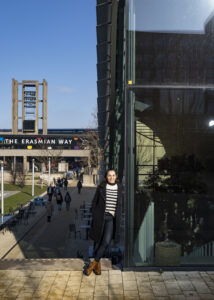CID Young Talent: Michelle Achterberg
Michelle Achterberg: ‘We should not underestimate the child brain’
By Eline Kraaijenvanger
Photo: Bram Belloni
‘My research within the L-CID looks at how children cope with social rejection. We have developed a new MRI task where children were accepted or rejected based on their personal profile. We based the profile on a friends’ book they had to fill in. They then came to the lab, and we explained: “We showed your profile to some other kids. During this game in the MRI scanner, you will see what they think of your profile: ‘nice’, ‘I don’t know’ or ‘not nice’.” These qualifications were purely fictional, but it allowed me to study social rejection in the brain, as well as aggression regulation. After the feedback, the children were allowed to supposedly play a loud noise in the ears of their peers, as a way to vent.
 We saw that there are certain networks in the brain that respond to both positive and negative feedback. These networks are already very similar to those of adults. There was, however, a difference in how the children handled their aggression after social rejection. This trait develops strongly between the ages of seven and 10 – a very formative phase of life. We saw that the more the brain region responsible for behavioural control is developed, the better one can control their aggression. This was the first study to demonstrate this, in almost 400 children; that is actually quite unique. It also proves that we really should not underestimate the child brain.
We saw that there are certain networks in the brain that respond to both positive and negative feedback. These networks are already very similar to those of adults. There was, however, a difference in how the children handled their aggression after social rejection. This trait develops strongly between the ages of seven and 10 – a very formative phase of life. We saw that the more the brain region responsible for behavioural control is developed, the better one can control their aggression. This was the first study to demonstrate this, in almost 400 children; that is actually quite unique. It also proves that we really should not underestimate the child brain.
‘We saw that the more the brain region responsible for behavioural control is developed, the better one can control their aggression. This was the first study to demonstrate this, in almost 400 children; that is actually quite unique.’
This kind of long-term research is incredibly valuable but requires a lot of patience. You literally have to wait for children to grow up. That is why I am happy to have been involved with the CID for 10 years now. All the success of this consortium is due to a lot of smart people putting their heads together in order to work together.
Outside my research, I am active in local politics and invest a lot of my time in science communication. This stems from a kind of rebellious impatience. I thought: we have so much data, why is nobody doing anything with it? So, I decided to do it myself. Every little bit helps and this way I can pass on my knowledge.’
Michelle Achterberg is a postdoc at Leiden University, and an assistant professor at Eramus University Rotterdam.
This article is part of a New Scientist special issue about the Consortium on Individual Development, that will appear in September 2023.
